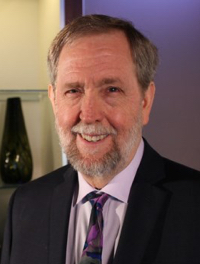
Doug Rauch retired as president of Trader Joe’s nearly a decade ago. But there’s still one question he gets more than any other: “What’s the secret to Trader Joe’s success?”
Rauch reels at the question, because, as he said, “Trader Joe’s tells the world how they do things.” The grocery store started as a 7-Eleven convenience store “knockoff,” grew to become an acclaimed fresh format chain with 340 stores in 30 states in Rauch’s 31-year tenure.
“I’ll say the secret, if there is one, is the same as any great business: culture,” he said. “Culture is the one thing that nobody gets to copy. It’s your DNA. Plenty of businesses tried to copy Trader Joe’s, but they can’t.”
Giving the keynote at the 2017 Irrigation Show in Orlando on Nov. 9, Rauch spelled out some keys for business success that can be implemented by irrigation companies, by landscape pros or by anyone, he says.
“Great places to work outperform places that suck to work,” he said, zipping through some “boring charts” from the Wall Street Journal. “Simple as that.”
In a folksy 45-minute speech, filled with case studies that touted his C-level friends in various industries, Rauch wove through tales both personal and professional of learning to aim high—in some cases, literally, like when he threw out the first pitch at a Cubs game.
At every step of the way, Rauch circled back to the theme of company culture as the key to success.
“It’s an intangible,” Rauch said. “But if you had to wrap your hands around it, it would be how decisions are made, how people are promoted and your core, committable values.”
Values drive profit
While profit may be the air you breathe, Rauch said, it’s culture that leads to that profit.
Referring to millennial customers and employees as “aspirationals,” Rauch lauded clothing retailer Patagonia, which shirks consumerism and encourages people to buy only what they need.
“It turns out more and more whether you’re a customer-facing or business-facing business, people want to know it’s the context of our values as much as the content of your product.”
People drive values
When Trader Joe’s moved from the West Coast to the East Coast three decades ago, Rauch determined that “people need to try your product to trust your product,” especially if it’s being sold by “people walking around in Hawaiian shirts in Boston,” which looked like “the circus come to town.” They set up demo stations in their new stores, but long-time employees were skeptical of the practice.
“The idea of giving food away was not part of the culture. We started communicating why we were doing this, said let’s watch it and see how it changes how customers interact with your store. Before you know it, it’s a part of the company, a critical part of who we are.”
The key, according to Rauch? Culture isn’t slogans and marketing.
How decisions are made
Like many small business leaders in any industry, Rauch says his early days at Trader Joe’s were racked with the knowledge he was responsible for designs large and small. He says landscape and irrigation pros are no different.
“You’re recovering controlaholics,” he says. “You’ve got to let your people make their own mistakes. It’s a tricky lesson, and it’s one that I had to learn the hard way.”
Luckily an early mentor warned him of the decision-fatigue he and the business would succumb to if he didn’t allow his team to decide—and fail. After retiring, he was featured in a Harvard Business Review case study about succeeding by failing.
“This company will never grow if you’ve got to make every decision,” he says. “You’ve got to grow your profit by growing your team.
Of course, Rauch cautioned (only half jokingly), “Don’t fail on GAAP reporting or your sexual harassment policy; that’s not where you take risks.”
“Make sure it’s learning-ful—an appropriate, survivable risk,” he said.

